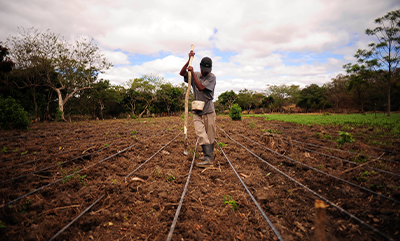Professors Receive Editors’ Choice Award for CKDu Article.
 Three School of Public Health professors are part of a team that has received the 2019 Editors’ Choice Award from The American Journal of Kidney Diseases. Daniel Brooks, associate professor of epidemiology; Madeleine Scammell, associate professor of environmental health; and Michael McClean, associate dean for research and faculty advancement and professor of environmental health, received the award for their article “Acute Kidney Injury in Sugarcane Workers at Risk for Mesoamerican Nephropathy,” published in October 2018. The professors are part of the SPH Research Group for the Study of Chronic Kidney Disease in Central America, which has investigated Mesoamerican nephropathy—also known as chronic kidney disease of unknown origin (CKDu)—since 2009.
Three School of Public Health professors are part of a team that has received the 2019 Editors’ Choice Award from The American Journal of Kidney Diseases. Daniel Brooks, associate professor of epidemiology; Madeleine Scammell, associate professor of environmental health; and Michael McClean, associate dean for research and faculty advancement and professor of environmental health, received the award for their article “Acute Kidney Injury in Sugarcane Workers at Risk for Mesoamerican Nephropathy,” published in October 2018. The professors are part of the SPH Research Group for the Study of Chronic Kidney Disease in Central America, which has investigated Mesoamerican nephropathy—also known as chronic kidney disease of unknown origin (CKDu)—since 2009.
Four of the nearly one hundred articles published by AJKD in 2018 were chosen by the editors for their contributions to the field of nephrology. Brooks, a co-corresponding author of the study, says the team’s article helped shed light on possible causes of a kidney disease that is seen mainly in Central America and that differs from more typical forms in the United States.
“Our study had two main findings,” says Brooks. “First, more than 10 percent of field workers tested had evidence of kidney injury that was new since the beginning of the harvest season. Second, a significant fraction of those workers with acute kidney injury went on to develop chronic kidney disease over the next year.”
He says it was also notable that the cane cutters—the workers exposed to the most heat stress—developed both acute injury and chronic kidney disease at the highest rates.
Previous studies had already suggested an association between heat stress and chronic kidney disease. The prevailing theory was that CKDu, due to heat stress, would result from the cumulative effects over time of repeated low-grade injury that was too subtle to detect with standard laboratory tests. The SPH study suggested that CKDu could also be caused, at least in part, by episodes of detectable kidney injury that did not necessarily require a prolonged duration of exposure. The longitudinal aspect of the study allowed the team to connect the acute injury with subsequent chronic injury.
CKDu has caused more than 20,000 deaths in communities along the Pacific Coast of Central America over the past two decades. Evidence suggests that more than one factor contributes to the high rate of disease, including heat stress brought on by strenuous work in hot temperatures, often with insufficient hydration.
In the US, kidney disease affects women and men at roughly equal rates and is relatively rare below the age of 60, but CKDu mainly affects young men (usually in their 20’s or 30’s) who live in rural communities and do manual labor in agriculture and other industries. In some areas, more than 30 percent of young men develop the disease. Medical resources are limited and treatments known to slow the progression of disease are in short supply, leading to high death rates and families left with little income.
Since the study’s publication, the research team has continued working to understand the underlying mechanisms of why some workers develop CKDu while others do not. They are currently in the middle of a five-year longitudinal study in El Salvador and Nicaragua, led by Scammell, that measures workers’ exposures to heat stress and environmental toxicants like pesticides and metals. The team is also conducting a study in collaboration with colleagues at Harvard University to determine whether genetic susceptibility plays a significant role in the development of CKDu.
“Right now we don’t have an answer, but I do feel we’re getting closer,” says Brooks.
Among the additional authors of the article, 13 are researchers from the SPH Research Group, including co-corresponding author David Friedman of Harvard Medical School, and Damaris Lopez-Pilarte, a full-time BU research coordinator in Nicaragua.